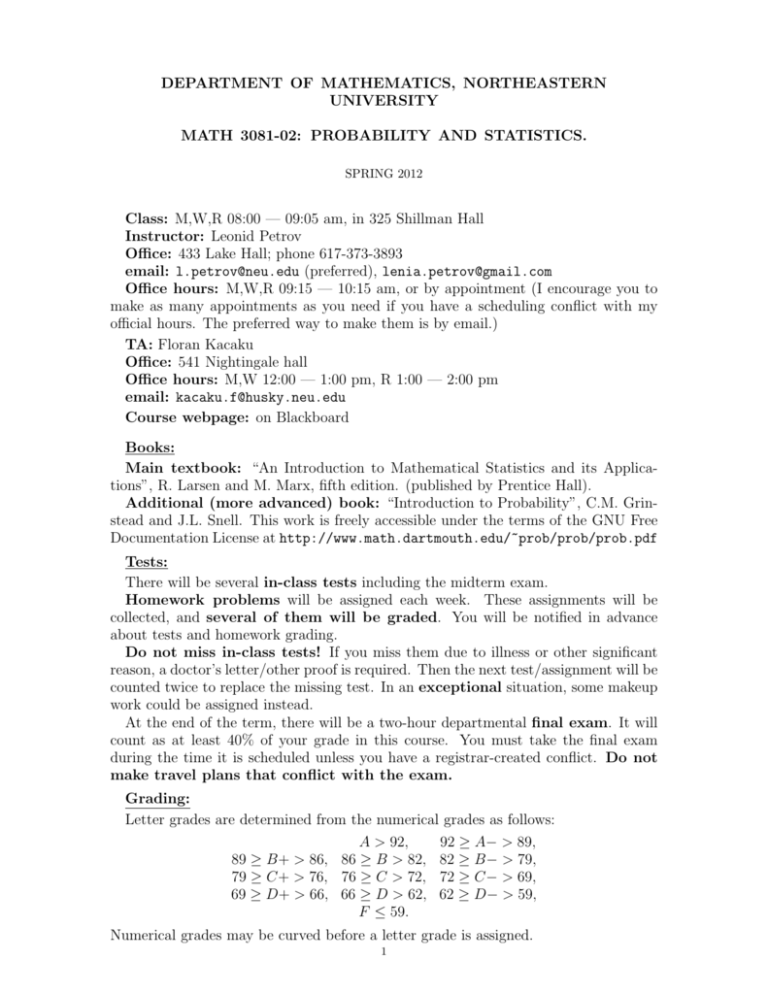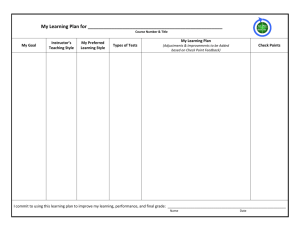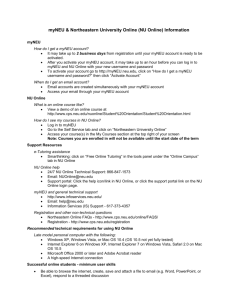Syllabus pdf - Faculty Virginia
advertisement

DEPARTMENT OF MATHEMATICS, NORTHEASTERN UNIVERSITY MATH 3081-02: PROBABILITY AND STATISTICS. SPRING 2012 Class: M,W,R 08:00 — 09:05 am, in 325 Shillman Hall Instructor: Leonid Petrov Office: 433 Lake Hall; phone 617-373-3893 email: l.petrov@neu.edu (preferred), lenia.petrov@gmail.com Office hours: M,W,R 09:15 — 10:15 am, or by appointment (I encourage you to make as many appointments as you need if you have a scheduling conflict with my official hours. The preferred way to make them is by email.) TA: Floran Kacaku Office: 541 Nightingale hall Office hours: M,W 12:00 — 1:00 pm, R 1:00 — 2:00 pm email: kacaku.f@husky.neu.edu Course webpage: on Blackboard Books: Main textbook: “An Introduction to Mathematical Statistics and its Applications”, R. Larsen and M. Marx, fifth edition. (published by Prentice Hall). Additional (more advanced) book: “Introduction to Probability”, C.M. Grinstead and J.L. Snell. This work is freely accessible under the terms of the GNU Free Documentation License at http://www.math.dartmouth.edu/~prob/prob/prob.pdf Tests: There will be several in-class tests including the midterm exam. Homework problems will be assigned each week. These assignments will be collected, and several of them will be graded. You will be notified in advance about tests and homework grading. Do not miss in-class tests! If you miss them due to illness or other significant reason, a doctor’s letter/other proof is required. Then the next test/assignment will be counted twice to replace the missing test. In an exceptional situation, some makeup work could be assigned instead. At the end of the term, there will be a two-hour departmental final exam. It will count as at least 40% of your grade in this course. You must take the final exam during the time it is scheduled unless you have a registrar-created conflict. Do not make travel plans that conflict with the exam. Grading: Letter grades are determined from the numerical grades as follows: A > 92, 89 ≥ B+ > 86, 86 ≥ B > 82, 79 ≥ C+ > 76, 76 ≥ C > 72, 69 ≥ D+ > 66, 66 ≥ D > 62, F ≤ 59. 92 ≥ A− > 89, 82 ≥ B− > 79, 72 ≥ C− > 69, 62 ≥ D− > 59, Numerical grades may be curved before a letter grade is assigned. 1 2 Syllabus: (sections in the main textbook) week week week week week week week week week week week week week 1. 2. 3. 4/5. 6. 7-8. 8-9. 9. 10. 11. 12. 13. 14. introduction, sample space, events: 1 and 2.1-2.2 probability assignments and axioms: 2.3 conditional probability and independence: 2.4-2.5 repeated trials, random variables and distributions: 3.1-3.4 independent random variables, expected value and variance: 3.5-3.7, 3.9 law of large numbers, law of small numbers, central limit theorem: 4.2, 4.3 intro to statistics, confidence intervals: 5.1, 5.3 estimation and maximum likelihood: 5.2, 5.4 method of moments, confidence intervals: 5.2, 5.3 hypothesis testing, type I, II errors: 6.1-6.4 likelihood ratio tests, p-values: 6.5 normal distribution, one-sample t-test: 7.1-7.4 two-sample problems: 9.1-9.4 Learning the material: This is a rather intense course with a lot of material. The best way to learn it is to do the homework problems every week. Assignments will be posted on the course webpage (at the Blackboard). Please ask me questions about things you don’t understand, either in class or at my office. DON’T wait until you feel completely lost! Prerequisite: This is a Calculus-based course, and assumes a working knowledge of single-variable calculus as well as some acquaintance with multi-variable calculus. If you are not familiar with single-variable calculus, you should not take this course. IMPORTANT: COMPUTERS, CELL–PHONES: These must be turned off during the class. CHANGES IN THE SYLLABUS: It is your responsibility to be aware of any changes the instructor may make to the syllabus as they are announced in class, or as posted on the course webpage. Students are responsible for all information given when they are absent. ISSUES: If you have a concern about the course or the instructor that is not or cannot be resolved by speaking with the instructor, the next step is to speak with the course coordinator. If the course coordinator does not settle the matter, contact Professor D. King (Undergraduate Director), 447LA, x5679, d.king@neu.edu. ACADEMIC HONESTY: The Northeastern University’s Rules of Academic Honesty and Integrity apply to this course. The following is taken from the Academic Integrity Policy: “A commitment to the principles of academic integrity is essential to the mission of Northeastern University. The promotion of independent and original scholarship ensures that students derive the most from their educational experience and their pursuit of knowledge. Academic dishonesty violates the most fundamental values of an intellectual community and undermines the achievements of the entire University.” Cheating in this class includes (but is not limited to): looking at the papers of others during a quiz or test, talking to other students during a quiz or test, using a mobile electronic device to acquire information during a test. All incidents of cheating will be reported to OSCCR (the Office of Student Conduct and Conflict Resolution). For more information please see http://www.northeastern.edu/osccr/academichonesty.html 3 INCOMPLETE GRADE: The grade I (Incomplete) will be given only if you have a good attendance record, have missed the Final for a good reason, and otherwise you are doing passing work. Incomplete grade is given at discretion of instructor. CHANGE OF GRADES: It is University policy that no grade, including an incomplete, can be changed after one year. Exceptions must be authorized by the Academic Standing Committee. TRACE EVALUATION: It is expected that every student will complete the TRACE evaluation as part of the course. FINAL EXAM TRAVEL PLANS: It will not be possible to change the time and date of the final exam. So, all students without legitimate conflicts (approved by the instructor) will take the final exam at the scheduled date and time. Go to http://www.registrar.neu.edu/finexsched.html to see the dates of your final exam. Do not make travel plans that conflict with the final exam.







